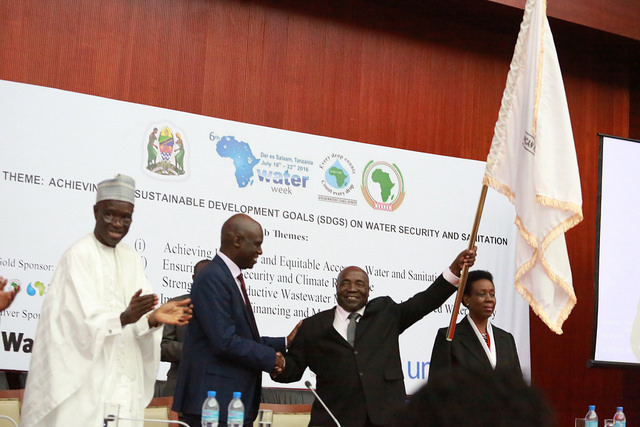Activities at the expansive Julius Nyerere International Conference Centre in Dar es Salaam hit a crescendo on Sunday (24 July, 2016) as over 30 African water ministers and high-level delegations from 53 African nations adopted a roadmap aimed at achieving sustainable and universal access to safe water and sanitation all over the continent.

The adoption of the roadmap titled “The Dar es Salaam Roadmap for achieving the N’gor Commitments on Water Security and Sanitation in Africa” drew the final curtains on the 10th AMCOW General Assembly and the 6th Africa Water Week which began last Monday (18 July, 2016) in Tanzania.
With a strategic objective of making considerable progress on water security and sanitation in line with the Agenda 2030 by improving efficiency, transparency and integrity within sector institutions to achieve sustainable services and create a conducive investment climate as well as integrating the agenda for water, sanitation and climate to improve health and nutrition outcomes, the Dar es Salaam roadmap aspires to ensure coherence in policy implementation, increase gender, equity and social inclusion, and transboundary cooperation in Africa.
African water ministers believe that, by increasing transparency and accountability in the sector, governments across Africa would be able to account for financial contributions, focus on complementing existing initiatives with a view to avoiding overlap and redundancy and ensure a participatory environment for civil society and citizens in policy formulation, sector planning and monitoring.
The roadmap also recognises the role of innovative financing and budgetary prioritisation for the water sector, sanitation and monitoring. Other aspects of the ministers’ plan of action for the continent’s water resources include provision of drinking water, improved sanitation, hygiene, effective and efficient management of wastewater, transboundary water resources, and strengthening Africa’s capacity to respond climate change.
The 10th General Assembly of the African Ministers’ Council on Water (AMCOW), which held on the side lines of the biennial 6th Africa Water Week, also witnessed a change of guards as the Water and Irrigation Minister of the United Republic of Tanzania, Gerson Lwenge, took over the reins of AMCOW presidency from his Senegalese counterpart, Amadou Mansour Faye, who held forth from 2014 to 2016 while Dr. Canisius Kanangire was officially unveiled as the new AMCOW Executive Secretary. Dr Kanangire, who hails from Rwanda, is the immediate Executive Secretary of Lake Victoria Basin Commission (LVBC) and has over two decades of high level experience in water resources management. He succeeds Mr Bai Mass Taal, who leaves AMCOW after eight years of admirable leadership.
In his acceptance speech, the new AMCOW President expressed delight at AMCOW’s rotational mechanism which led to his emergence and he urged his colleagues to roll up their sleeves for the onerous but achievable task of ensuring the realisation of the SDG-6 in Africa.
“We must build and sustain cooperation among riparian countries in managing transboundary water resources as it is a fact that the more we invest in managing water resources, the more we strengthen AMCOW and the more we advance collectively towards achieving SDG-6,” Lwenge, an engineer, said.
To serve alongside the new AMCOW President are Water Resources ministers from Central African Republic, South Sudan, Egypt, Swaziland and Liberia, who were elected AMCOW Vice Presidents representing central, east, north, southern and west African sub-regions.
Addressing the General Assembly, Vice President Samia Suluhu of Tanzania urged the august assembly of water ministers from across the continent to “tackle present and future challenges by diversifying our sources of water and be innovative in financing mechanisms taking into account the huge funding requirements for the sector, and the urgency of mobilising funds to put the right infrastructure and skilled manpower to develop and manage the sector more efficiently.”
Also speaking at Africa’s flagship water event, the Commissioner for Rural Economy and Agriculture of the African Union Commission, Rhoda Peace Tumusiime, implored Member States to step up efforts to realise the African Agenda 2063 on the Africa we want because, according to her, water is key to reducing poverty in Africa.
“There is need for us to put in place sound policies, legal and regulatory frameworks to support investments from various sources in water, sanitation and hygiene and also promote gender equality and women empowerment,” she added.
Organised by AMCOW in collaboration with the Department of Rural Economy and Agriculture of the African Union Commission alongside regional and international partners, the 6th Africa Water Week represents a political commitment at the highest level for creating platform to discuss and collectively seek solutions to Africa’s water and sanitation challenges.
